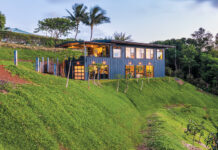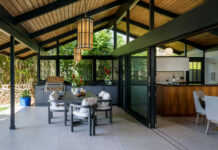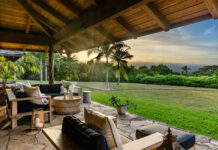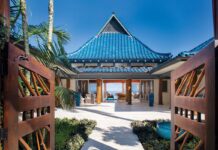Story by Sky Barnhart | Photography by Nina Lee | Styling by Michele Lin
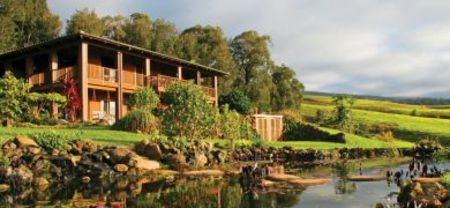 The organic garden at Kulamanu Farm is in the shape of a mandala. The Sanskrit pattern represents the universe and the circle of creation, from the tiniest atom to the entire galaxy.
The organic garden at Kulamanu Farm is in the shape of a mandala. The Sanskrit pattern represents the universe and the circle of creation, from the tiniest atom to the entire galaxy.
Standing inside the waist-high stone terrace—vibrant bunches of carrots, beets and kale soaking up the sun just inches from my fingertips, and the fragrance of basil embracing me—I think that if everyone had a mandala garden, there would be no more war in the world.
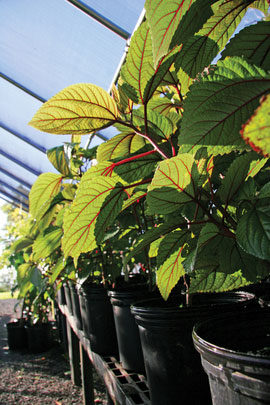
“It’s a really easy system,” says Anne, who farms this particular mandala. “I filled it up with compost, set up drip irrigation, and now I have all the fresh vegetables I can eat.”
Anne’s mandala garden is simple, functional and beautiful—a theme that’s repeated throughout the Kula farm she owns and operates. If it grows here, it’s either a food or a native plant—or a pretty flower. “I’m not a purist,” Anne smiles.
Maybe that’s why Kulamanu works so well. The nine-acre organic farm and native-plant nursery hums with the serene vibe of people who take pleasure in how they work and live.
Anne is a sixth-generation Hawai‘i resident whose great-great-grandfather was minister plenipotentiary (similar to an ambassador) to King Kalakaua and later to Queen Liliuokalani. An ornate carved chest given him by the king of Spain stands in Anne’s hallway, lending a settled feeling to a house that is barely a decade old.
Despite its relative youth, Anne’s house at Kulamanu sits graciously on the land like a benevolent matron.
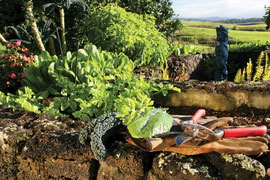 The two-story cedar home was built in 1999 by environmental lobbyist Bob Pierce and his wife, Jackie, on what was originally Haleakala Ranch land. A generous wraparound lanai encompasses sweeping views of the rolling pastures, with blue ocean far below.
The two-story cedar home was built in 1999 by environmental lobbyist Bob Pierce and his wife, Jackie, on what was originally Haleakala Ranch land. A generous wraparound lanai encompasses sweeping views of the rolling pastures, with blue ocean far below.
Anne moved here in 2003, after renting out the upper farm she had inherited from her grandparents.
Aside from the avocado and bird-of-paradise, the only landscaping at the time consisted of some ti plants. Over the years, she has made many enhancements to the surroundings, but the house itself she’s been happy to leave as is.
“Bob did a lot of really smart things,” Anne says. “The insulation between the ceiling and the roof is what they use on the space shuttle; it’s incredible! The house really stays warm in winter.” (Twenty-eight-hundred feet above sea level can get chilly by Maui standards!)
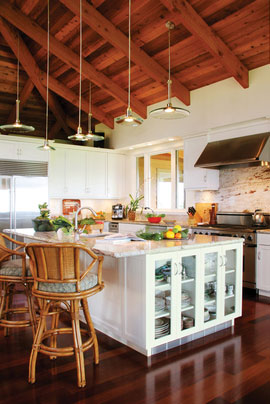
A domed skylight over the great room brings in abundant natural light, and ceiling fans keep the air circulating. After seeing Al Gore’s documentary, An Inconvenient Truth, Anne says she was inspired to make the shift to a more energy-efficient lifestyle.
She installed photovoltaic panels on the garage, from which she now runs all her electricity. “My bill is down to less than $30 a month,” she says.
With a solar hot-water heater, low-flush toilets and two big catchment tanks to help irrigate the farm, as well as a biodiesel truck, she is well on her way to green living.
“It’s pretty impossible to make a perfectly green house, but it’s easy to keep it lit and run,” she says. “You don’t have to live in a mud house or a straw-bale house!”
Anne describes her home’s style as “Ranch Hawaiiana with a little bit of Japanese Zen.” The home’s décor is spare and personalized, allowing the pastoral views from every window to act as adornment.
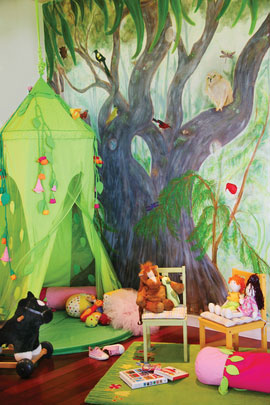
Delicate paintings of Native Hawaiian birds decorate the guest bathroom, and native birds peep from the branches of a huge tree painted on the wall of her three-year-old daughter’s room.
Local artist Vanessa Massey adorned the mural with ‘i‘iwi (scarlet honeycreeper), ‘o‘o (black honey eater), pueo (Hawaiian owl) and ‘ope‘ape‘a, or hoary bat, along with a few fairies and a Hawaiian happy-face spider.
The magical feeling extends throughout the little girl’s room, with flowers spilling down the sides of a green “fairy tent” hanging in one corner, and a kindly monk seal beaming from the wall by the door.
Always a nature lover, Anne grew up with a particular passion for Hawai‘i’s native plants and birds that deepened during her years of work with the Nature Conservancy and the Maui Forest Bird Survey.
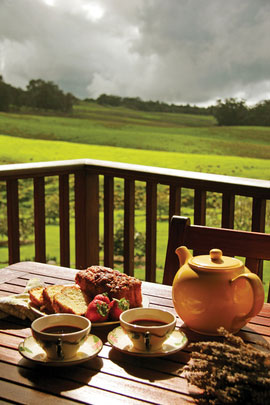 As we walk around the property, she points out treasures of her native-plant collection: the reddish blooms of a rare kokia hibiscus, tufted pili grass peeking from behind a red ti, a tall variegated banana bending near the lanai.
As we walk around the property, she points out treasures of her native-plant collection: the reddish blooms of a rare kokia hibiscus, tufted pili grass peeking from behind a red ti, a tall variegated banana bending near the lanai.
She has me stoop to smell the tiny yellow blossoms of the holei, or native miniature plumeria.
“Planting natives in your yard gives you an awareness of what was here,” she says. “It gives you a sense of place and belonging. . . . Yards can look the same everywhere. Why not grow what grows best here?”
Passing the catchment tanks and an orchid shed, we reach the native-plant nursery. Here, black pots are lined up in rows: ‘ohi‘a lehua, ‘a‘ali‘i, mamaki.
When they are big enough, these plants will be sold to local organizations and businesses like Maui Nui Botanical Garden and Kula True Value Hardware & Nursery.
Kulamanu also grows medicinal herbs like echinacea and valerian for wholesale, and supplies organic avocados to local health-food stores, and birds-of-paradise to local florists. It’s a busy farm, although on this sunny weekday, the feeling of peace belies the productivity.
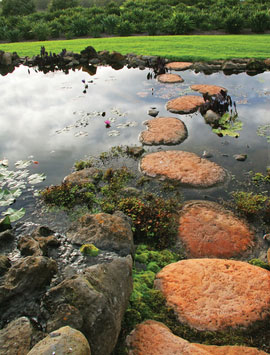 The sense of harmony is enhanced by the sound of water flowing from a rock fountain in the center of the circular driveway. Silvery ‘ahinahina and the native sedge ‘ahu ‘awa peek from among the rocks.
The sense of harmony is enhanced by the sound of water flowing from a rock fountain in the center of the circular driveway. Silvery ‘ahinahina and the native sedge ‘ahu ‘awa peek from among the rocks.
“When my daughter was little, if she was upset, we’d walk out here and sit on the rocks and she’d talk to the fairies,” Anne recalls.
Fairies are also likely to hide in the pretty pond below the house. Situated to catch rainwater and runoff, the pond reflects the blue sky above. We walk out into the center on steppingstones that could just as well be lily pads like the ones floating around us.
Back at the house where we say our goodbyes, huge kupukupu and feathery hapu‘u ferns frame the doorway. The cinnamony scent of Chinese magnolia wafts on the breeze. Although the tree is not a native, “I made an exception for smelly things!” Anne says.
The pleasure it brings is in keeping with Kulamanu’s philosophy: farming at its loveliest, in harmony with the universe.
Check out 10 tried-and true organic gardening trips courtesy of Kulamanu.

